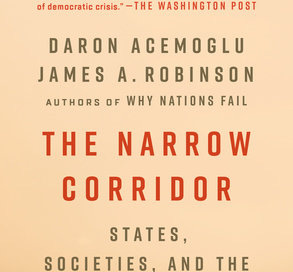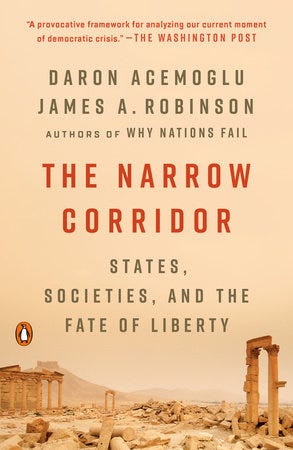The Narrow Corridor: States, Societies, and the Fate of Liberty
by Daron Acemoglu and James A. Robinson
Most countries in the world are extremely messed up, both in the present day and historically. All sorts of explanations have been given for this over time, and the ones that people usually subconsciously believe suggest that some people are just superior to others and that’s why they have better governments. As someone whose family immigrated from a Messed Up Country, I’ve never been particularly enamoured with this argument. Even leaving aside the implied personal slight, it’s not at all been clear to me that the people I have known from Messed Up Countries were less intelligent or hardworking than the people I’ve known in the Good Countries. If anything sometimes its felt like the opposite is the case, if for reasons of Darwinian environmental stress pressure and nothing else. There has to be something else going on here.
Political scientists Daron Acemoglu and James A. Robinson wrote one of my favorite books on state development years ago, Why Nations Fail. They’re now back with another banger called The Narrow Corridor, which could’ve also been called “Why Nations Succeed,” since that’s effectively what it’s about. Why Nations Fail explained how institutional histories tend to predetermine the future course of national development. If countries develop predatory institutions early in their development, often due to combinations of contingent historical factors that basically amount to chance, or, sometimes, due to planned imposition by outside forces like that which took place during European colonialism in Africa, they tend to get stuck in a vicious cycle. Everyone is always fighting to be in control of the levers of predation and the institutions became a means for extracting spoils from the country rather than developing it for the public. This is very difficult cycle to break once it gets embedded over a few generations.
The thesis behind The Narrow Corridor is that nations that succeed do so by creating a balance between the powers of the state and the powers of society, and maintaining that rough balance over time. A powerful state is necessary to live a good life in the modern world, and the absence of a state leaves an individual vulnerable to the violent Hobbesian state of nature. The problem is that a powerful state often becomes a monster in its own right, devouring the people it is meant to serve and imposing ever-increasing exploitation upon them until the system finally collapses. This cycle of extraction by states was documented by none other than Ibn Khaldun, who noted that in the long-term rulers had an incentive to keep ratcheting up taxes and other forms exploitation on those that they ruled This is basically the experience of living in tyranny, as many around the world do today, which can be just as bad as the worst anarchy.
What people need to thrive is a powerful state that is shackled by another equally powerful force. That force is usually what we call civil society, or just society. A mobilized public that has its own legally embedded rights and is vigilant in exercising them is a potent enough force to transform the state into what the authors refer to as a Shackled Leviathan. The free press, unions, religious organizations, social clubs, and even random angry people on social media are all expressions of the public will. When they have legal rights like free speech and freedom of assembly they can collectively impose a serious check on state power. The authors describe the relationship between the state and the public as a race, where both are seeking to accrue as much power as possible and the ideal situation is when both keep up and manage to keep some kind of parity.
When this parity exists, the state will usually end up acting in the interest of the public rather than simply preying on it. When it doesn’t exist, you see situations like China and Iran where the people are deprived any right to public participation in politics and often wind up just being the victims of their governments. In those countries the state hogs for itself all the powers of politics and ends up becoming a gigantic monster sitting on top of the people. The authors of this book go through tons of historical examples to explain how things got to this point in certain places, including digging up ancient Chinese political theories like legalism that created the ideological basis for state domination of society in Chinese culture. There is a secret history of conflict between civil society and the state in many places, and in some of them it just ended in overwhelming victory for the latter.
Why did Europe end up with the right mix of factors for success sometime in the 1500s? Much of the continent had previously been dominated by powerful state institutions of the Roman Empire, which was an empire like many others in India, China, and the Middle East. But the post-Roman world also had a counterbalancing force in the participatory traditions of the German tribes that conquered them. When the empire collapsed, some of its institutional structures still stuck around, or were at least recoverable. But the people now also had the customs of the conquering Germans who were used to sitting around in their tribal gatherings and debating things in a kind of local proto-democracy. The combination of these two forces, diffused over time and various different locales touched by both Roman and Germanic influence, are described by the authors as the blades of a pair of scissors that gave European societies the right balance between societal and state power. The success of Europe is the aftermath of the Roman state mixed with the egalitarian traditions of the Germanic tribes, both balancing one another. It was a very fortuitous case of cultural synthesis indeed.
There’s one other aspect to the story of national success which does not deal with states per se. Certain social norms can also lock people into a position of unfreedom and underdevelopment over a long period of time. The authors point to the Hindu caste system, African tribal customs related to witchcraft, and the Islamic ulema-state alliance as examples of webs of norms that are often used to deny individual freedom to people in the interests of those with power. The state may be more or less powerful, or even in some cases nonexistent, but people can still be dominated by social norms that deny them liberty, which the authors define as the ability to exercise ones full capacities as a human being without fear or unwarranted constraint. Breaking cages of norms is a bit harder than managing state-society relations (which itself is not easy) because the norms often have a high degree of legitimacy with the same people that they are constraining. They don’t really offer a solution to this but its another aspect of historical baggage that can keep societies from reaching their full potential.
This book, Why Nations Fail, and, honestly, Guns Germs and Steel, combine together to give a powerful set of tools to diagnose why power is configured in the world as it is today. I pride myself on being reasonably “based,” but I’m just not compelled by the lazy IQ-determinist arguments I see promoted by iconoclast-branded social analysts. It strikes me as one of those simplistic explanations that people find attractive since it seems to explain everything and doesn’t necessitate any further thought. The reality is that the development of human societies is very path dependent. Most of us are born into contingent circumstances that were preconfigured long before our births, and very few can say that the accidents were constructive.
The lesson for the United States today is that we need to keep building state and social capacity in parallel with one another if we are to avoid the unhappy fate of falling into either tyranny or Grand Theft Auto-like anarchy. Emphasizing one to the neglect of the other is not good, and these days I do feel like we are hewing a bit too close to the anarchy side. Reading about what life is like when all the institutions are predatory makes me freshly grateful to God to live in a Good Country and also motivated to do everything possible to keep it that way. Let’s hope that we can keep the two blades of the scissors balanced.




Couldn't it be said that power over others is and has always been appealing? Political systems vary, but the idea we see around the world both now and in the past is for those holding power to maintain it by keeping the mass in thrall to a mythology that endorses the status quo.
The United States is an example of how even the most carefully designed political system can be gamed by power. The Congress could not be more captive to big money (business) and business is the plaything of the venture capitalists who, sitting at the top of the wealth pyramid raid businesses for personal profit.
The USSR was supposed to be free of the accumulation of personal property, but it had it own elite living in their dachas and holding power over the many who had to endure bleak lives waiting in line for everything only to find shelves bare. It couldn't produce consumer goods
The secret of elite rule is to have a system that produces plenty of stuff and keeps the mass at least pacified and wanting just a bit more. That is what keeps the US going. John Q. Public is outraged at his government allowing the 1% to get away with everything, even letting it prey upon him as in the Great Mortgage Crisis, but he can always get a loan for a new car, get a loan for college and most important get a large screen that can keep him thoughtless for endless hours. The US is a nation of debtors (99%) in hock to creditors (1%), and has seen the income disparity steadily increase while remaining docile, certainly by European standards.
Efforts to build a left in the US have come and gone one after another because just enough adjustment is made to keep the pitchforks in the barn. My point in all this is that I doubt any deep analysis of political systems is needed. The few cleaning up while managing to provide bread and circuses for the many is the heart of the issue. Cheap mass produced products of technology have given us relative stability, a self-satisfied elite and a complacent mass regardless of political system. The mass has enough creature comforts that revolution is out of the question and ideology is moot. Just keep the goodies coming.
“Just as bad as the worst anarchy?” When have we ever had anarchy? What was the worst anarchy? Lol I feel like we’ve never really tried anarchy...